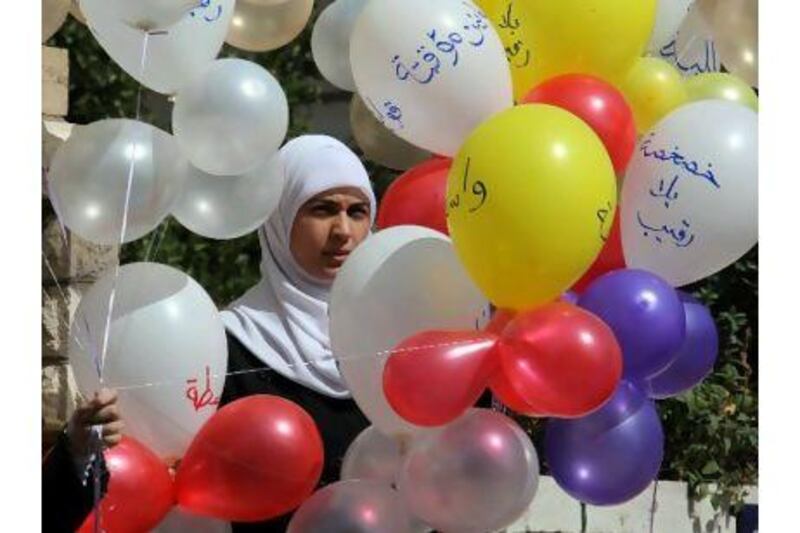AMMAN // The streets have mostly been cleared of the banners and adverts from the recent election campaign and the newly elected members of Jordan's lower house of parliament, all 120 of them, are preparing to assume their posts.
In the post-election quiet, what is most clear is that parliament is missing an opposition voice.
The Islamic Action Front (IAF), an offshoot of the Muslim Brotherhood, decided to sit out the election, an act that is raising concerns that the outcome of Tuesday's vote among some produced a pro-government legislature.
The boycott and election results also raise questions about how the opposition will compensate outside parliament for its absence within the building in Amman's Abdali section.
Sultan Hattab, a columnist close to the government who writes in Al Rai, the government-run paper, said: "Their boycott is a double-edged sword. This parliament is going to be fat-free without opposition, which will make it easy for the government to pass laws.
"But they made a mistake and their absence from the decision-making process will erode their popularity. If they want to be an effective opposition, they have to be present under the dome of parliament, but they missed the opportunity."
The government failed last month to persuade the Islamists to change their mind about the boycott. One, the other, or both may suffer for it.
Even before the elections, the Islamists repeatedly accused the government of attempting to marginalise them from the political process. The most recent attempt, they say, was an election law adopted in May that has further angered them because of the gerrymandering of districts loyal to the government at the expense of areas where the Islamists are strong.
The prime minister, Samir Rifai, told reporters this week: "Those who choose not to participate are only denying themselves a voice in charting the country's future."
The boycott is not without precedent. In 1997, the Islamists boycotted the parliamentary elections to protest against the 1993 one-man, one-vote election law that replaced a system whereby voters were entitled to as many votes as the parliamentary seats allocated for their district. Islamists felt disadvantaged by the law, which they saw as a response to their strong showing in elections in 1989, the year parliament was restored.
A new election law was passed in 2001, and then amended in 2003 but it kept the same voting formula. Regardless, they participated in the elections then.
Hamza Mansour, the IAF secretary general, said in an interview on Thursday: "We gave the country's decision-maker a chance to look into changing the law. It was a new era [after King Abdullah assumed the throne in 1999] and we were hoping to see changes and that's why we continued to participate in the elections. But it turned out that there [was this] insistence to continue with the same policies. Our hope to see reforms through parliament has been dashed and therefore we find it futile to take part in the political process. Reform starts with changing the election law and ceasing to issue temporary laws.
"The alternative now is to work outside parliament in an attempt to convince decision-makers to re-examine the policies that drove the country into chaos, with tribal violence erupting in several cities."
The elections this week were stained by scattered violence. In one incident, in the Amman neighbourhood of Wadi Al Seer, anti-riot police dispersed a crowd after fighting erupted between supporters of two rival candidates. The rioters destroyed two vehicles and threw stones at shops. Police said they arrested seven people. But the violence did not involve Islamists. With the boycott, it was not their election to fight.
Wary about losing its clout as it did after the 1997 election boycott, the Brotherhood is trying to present itself on the left side of the government. It has joined forces with other political figures and another group, the National Popular Party, which also boycotted the elections, and is pushing for changes through what it calls a national reform programme.
Mr Mansour said: "We are working together to push for modern laws and an elected government. This will not be easy because there is no political will for reform. There are means guaranteed by the constitution that allow us to express ourselves, like organising marches and issuing statements.
"If the government decides to ban us from the marches without any justification, then it will be responsible for its own actions."
Nevertheless, talk about the Brotherhood losing faith in the political process is creating unease in circles close to the government. The Brotherhood is close to Hamas and supports the rights of Jordanians of Palestinian origin in a country where they constitute half of the population of 6.4 million.
While the Islamists disagreed with the government on many issues, particularly its 1994 treaty with Israel, they continued to work as an influential opposition in parliament.
Samir Habashneh, a former minister of interior, said: "Their presence in parliament was a stabilising factor for the country in the sense that they worked in the ligh. As a politician, I am concerned that they will find other places to express themselves. The essence of the political work is positive engagement.
"When they boycotted the 1997 elections, they lost their platform under the dome and now they will lose that again. The government, too, will lose its opposition. The government needs an opposition that acts as a watchdog. It is facing economic challenges.
"Reform starts under parliament and they haven't participated. The government should resume a serious dialogue with them and try to find mutual understanding. The state has accommodated them since the '50s and we don't want to see the opportunity squandered."





